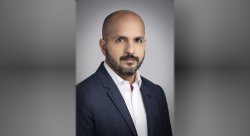Faculty Spotlight: Political Science & Law Instructional Specialist, Alfredo Toro Carnevali
Posted in: Faculty Spotlight, Homepage News and Events, Political Science and Law

Alfredo Toro Carnevali is an Instructional Specialist in Political Science and Law. He coordinates the minor in Global Security and Diplomacy, the Pollack Speaker Series on International Security and Diplomacy, and the Model United Nations Summer Academy at Montclair State University.
Tell us about your current research.
I am working with Research on Interdisciplinary Global Studies (RIGS) on a joint initiative between departments in the College of Humanities and Social Sciences and the College of the Arts, including Political Science and Law, Justice Studies, Religion, and Theatre and Dance Programs. The objective of the collaboration is to explore ethical ramifications of artificial intelligence (AI) in an increasingly interconnected world in which technology and humanity have become deeply intertwined.
Talk about the importance of your work from your perspective as a humanities scholar or social scientist – Why does it matter for society? What makes it valuable to our students?
From my perspective, humanities and social sciences’ value comes from its ability to open students to new ideas and to provide them with the tools to critically analyze their environments from multiple perspectives and theories, while becoming aware of the inherent biases and assumptions present in our daily lives.
What makes your approach to teaching and research unique or innovative?
My teaching style builds upon my ten years of experience negotiating and facilitating treaties and resolutions at the United Nations on topics that ranged from peacekeeping and peace-building, to nuclear non-proliferation and disarmament, and the prevention of terrorism, with colleagues from 193 countries.
Through a blend of real and fictional case studies, personal anecdotes, role playing and simulations, discussions and debates, readings of primary UN sources and selected secondary texts, documentaries, films and podcasts, I have attempted to create a series of courses that promote critical thinking, problem-solving, integration of knowledge, an awareness of biases and assumptions in concepts, models, and theories of international relations, and above all, a curiosity and a desire to continue to learn about world affairs.
Do you have a favorite course to teach?
Teaching POLS 104 International Security and Diplomacy to students from a diversity of majors that span from math and computer science to filmmaking, religion, and child advocacy, as well as justice studies, jurisprudence, and political science, has been both a challenge and a blessing. For more than four years now, I have been working on designing the perfect course that can combine a series of transferable skills, a solid foundational knowledge in world politics and conflict resolution, and a keen awareness of the biases and assumptions that underlie our understanding of the Global South.
One of my POLS 104 students in the Fall of 2019, wrote: “this class challenged everything that I thought I knew about Politics and what was going on around the world.” This comment, above all others, captures the essence of my pedagogical approach: to always challenge students to develop an openness to new ideas and to critically analyze international and global challenges from multiple perspectives and theories, while becoming aware of the inherent biases and assumptions present in our daily lines of reasoning.
What’s your favorite thing about Montclair State?
The students. In my experience, the students at Montclair State are very respectful and professional. I am always amazed at how well they manage their studies, work and family loads. Many of them have shown tremendous enthusiasm for the United Nations and multiculturalism. Two of the most recent clubs to gain SGA approval at MSU -the “Model United Nations Club” and “Global”- are the result of many months of hard work by a highly motivated group of students from Political Science, Justice Studies, Russian Studies, Sociology, and more. My part has been to connect students who over time have come to me expressing a common interest in creating clubs around the United Nations and Multiculturalism, and to provide motivation and support. Now that the two clubs have come into existence, I will continue to work with them as their adviser.
What are your hopes/goals for your students as they become the next generation of professional and engaged citizens of the world?
My greatest aspiration is that our students leave Montclair State University with a better understanding of the complexities of global politics and are prepared to play a leading role in forging a world that is more peaceful and just.
